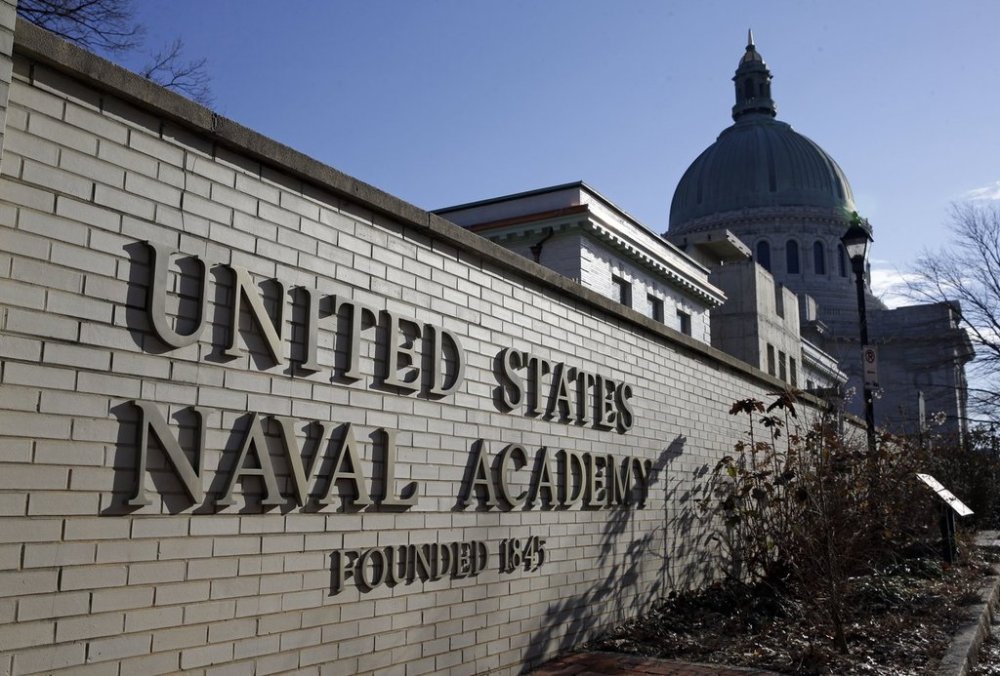US Naval Academy ends affirmative action in admissions
Advertisement
Read this article for free:
or
Already have an account? Log in here »
To continue reading, please subscribe:
Monthly Digital Subscription
$1 per week for 24 weeks*
- Enjoy unlimited reading on winnipegfreepress.com
- Read the E-Edition, our digital replica newspaper
- Access News Break, our award-winning app
- Play interactive puzzles
*Billed as $4.00 plus GST every four weeks. After 24 weeks, price increases to the regular rate of $19.00 plus GST every four weeks. Offer available to new and qualified returning subscribers only. Cancel any time.
Monthly Digital Subscription
$4.75/week*
- Enjoy unlimited reading on winnipegfreepress.com
- Read the E-Edition, our digital replica newspaper
- Access News Break, our award-winning app
- Play interactive puzzles
*Billed as $19 plus GST every four weeks. Cancel any time.
To continue reading, please subscribe:
Add Free Press access to your Brandon Sun subscription for only an additional
$1 for the first 4 weeks*
*Your next subscription payment will increase by $1.00 and you will be charged $16.99 plus GST for four weeks. After four weeks, your payment will increase to $23.99 plus GST every four weeks.
Read unlimited articles for free today:
or
Already have an account? Log in here »
Hey there, time traveller!
This article was published 28/03/2025 (213 days ago), so information in it may no longer be current.
ANNAPOLIS, Md. (AP) — The U.S. Naval Academy will no longer consider race, ethnicity or sex as a factor for admission to the service institution, a response to an executive order by President Donald Trump, according to federal court documents made public Friday.
The change in policy was made in February by Vice Adm. Yvette Davids, the academy’s superintendent, in response to an executive order issued by President Donald Trump in January, according to a court filing by the U.S. Justice Department in the 4th U.S. Circuit Court of Appeals.
The president’s order on Jan. 27 said that “every element of the Armed Forces should operate free from any preference based on race or sex.” It also directed the secretary of defense to conduct an internal review with respect to all “activities designed to promote a race- or sex-based preferences system,” including reviews at the service academies.

“Under revised internal guidance issued by the Superintendent on Feb. 14, 2025, neither race, ethnicity, nor sex can be considered as a factor for admission at any point during the admissions process, including qualification and acceptance,” according to the court filing made public Friday.
The decision comes after a federal judge ruled in December that the academy could continue considering race in its admissions process. In that case, the judge found that military cohesion and other national security factors mean the school should not be subjected to the same standards as civilian universities.
During a two-week bench trial in September, attorneys for the academy argued that prioritizing diversity in the military makes it stronger, more effective and more widely respected.
The case against the policy was brought by the group Students for Fair Admissions, which was appealing the judge’s decision.
The Justice Department asked in the filing on Friday to suspend the current briefing schedule in the case while the parties consider the change in the academy’s policy.
‘The parties require a reasonable amount of time to discuss the details of the Academy’s new policy and to consider the appropriate next steps for this litigation, including whether this litigation is now moot and, if so, whether the district court judgment should be vacated,” the Justice Department wrote.
Edward Blum, president of Students for Fair Admissions, praised the academy’s decision.
“Students for Fair Admissions welcomes the announcement that the U.S. Naval Academy will end its unfair and illegal race-based admissions policies. Racial discrimination is wrong and racial classifications have no place at our nation’s military academies,” Blum said in a statement.
Maryland Rep. Sarah Elfreth, a Democrat who serves on the academy’s Board of Visitors, criticized the change, saying “this disastrous decision will have negative implications on our military’s recruitment and retention for decades to come.”
“A Navy and Marine Corps that reflect the diversity of our country is our strongest Navy and Marine Corps,” Elfreth said. “Diversity and inclusion allow our academies to not just reflect how our country looks but are critical to mission readiness and strong national security.”
Students for Fair Admissions also brought the lawsuit challenging affirmative action that resulted in a landmark U.S. Supreme Court ruling in 2023.
The high court’s conservative majority broadly prohibited the consideration of race and ethnicity in college admissions, ending a long-standing practice meant to boost opportunities for historically marginalized groups and sending shock waves through higher education. But it carved out a potential exemption for military academies, suggesting that national security interests could affect the legal analysis.
Students for Fair Admissions later sued the Annapolis-based Naval Academy, challenging the exemption. But Judge Richard Bennett rejected their arguments, saying that the school had “established a compelling national security interest in a diverse officer corps.”
Attorneys for the group argued during trial that prioritizing minority candidates is unfair to qualified white applicants and that cohesion should arise from other sources such as training and command structure.
The academy argued in that case that its admissions process considers many factors, including grades, extracurricular activities, life experience and socioeconomic status, according to court testimony. Race often played no role in the process, but sometimes it came under consideration in a “limited fashion,” attorneys for the academy wrote in court papers.

